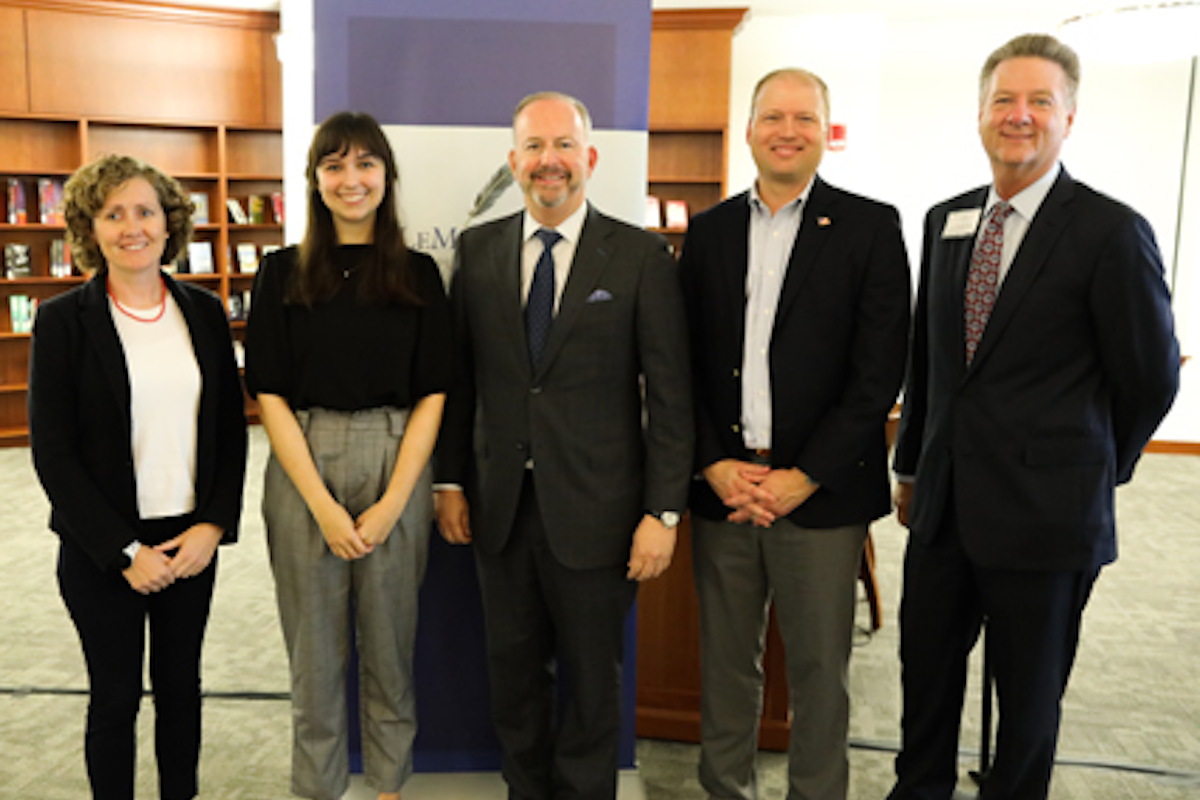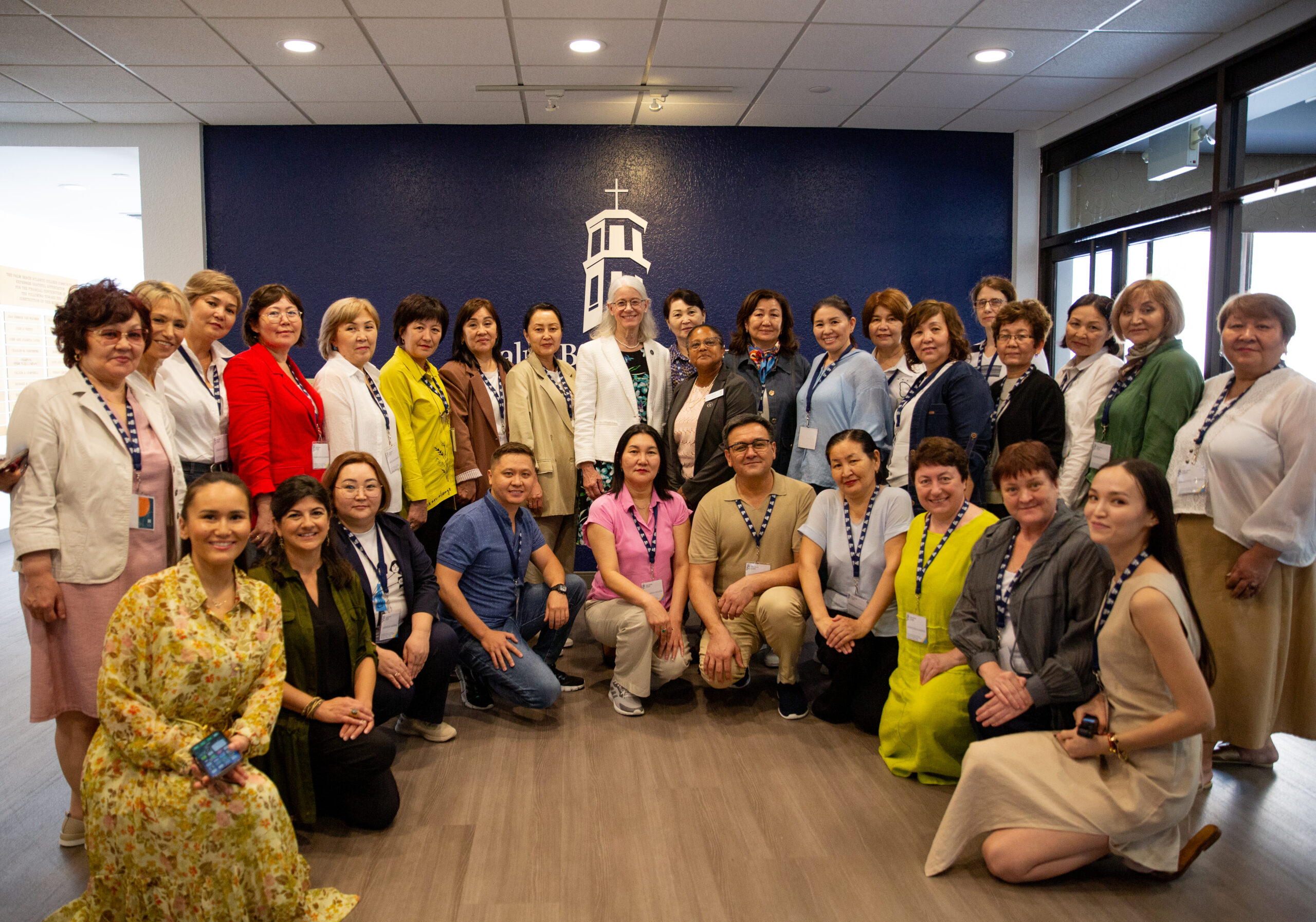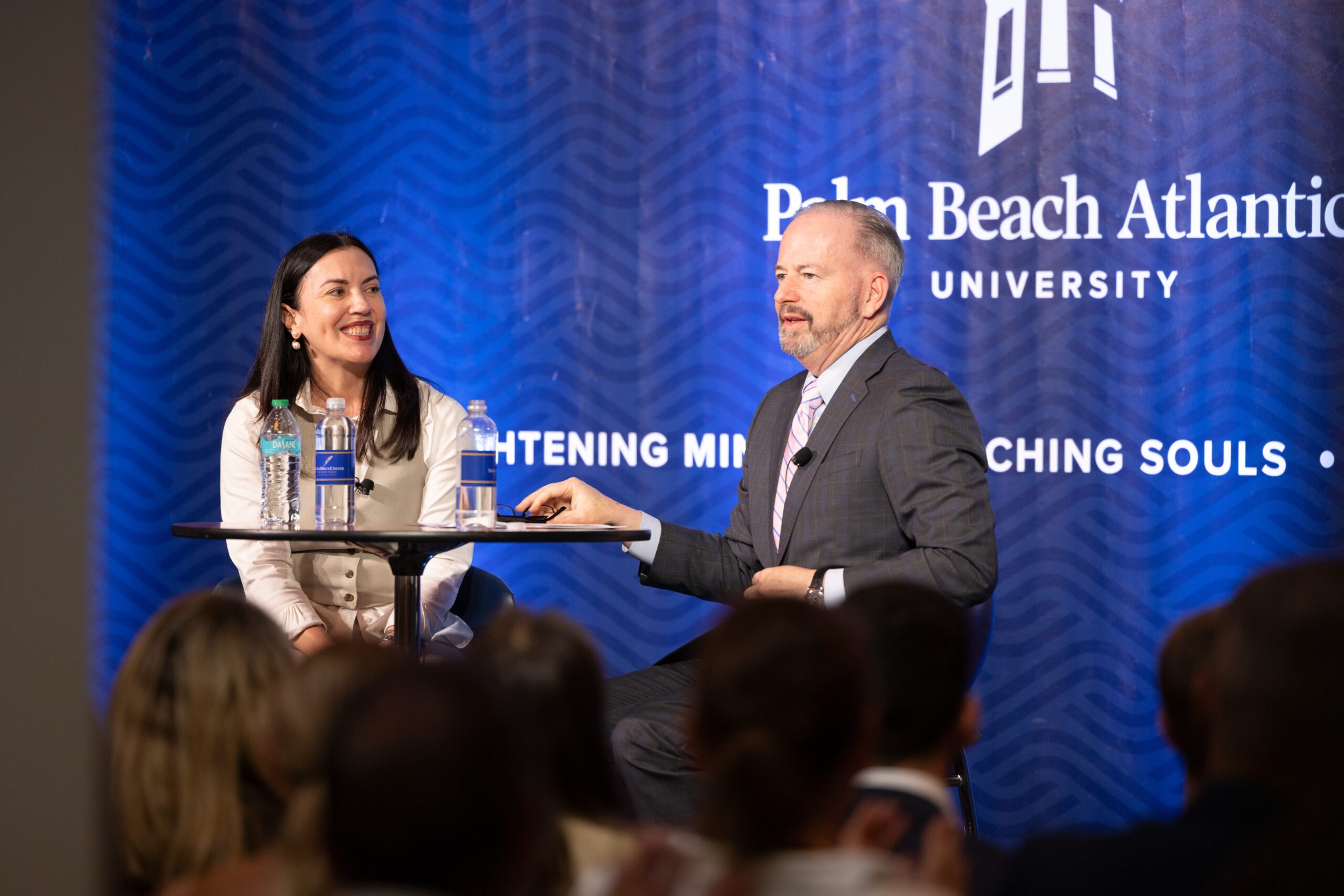Two alumnae who were selected as Freidheim Fellows presented their research on two pressing problems facing society: abortion and the ideological divide.
Shelby Braun and Sarah Kilpatrick discussed these issues and possible solutions during their presentations Tuesday night in the Lassiter Rotunda of PBA’s Warren Library.
The Freidheim Fellows program is part of the LeMieux Center for Public Policy, one of Palm Beach Atlantic’s six Centers of Excellence. The program is named for donors Marguerite “Mitzi” Freidheim and her husband, Cyrus. Fellows receive guidance from former U.S. Sen. George S. LeMieux, as well as a stipend to cover research costs and an independent study course.
The program provides an opportunity to discuss issues “in a way that is thoughtful, respectful and profound,” said LeMieux. “That’s what we need in this country.”
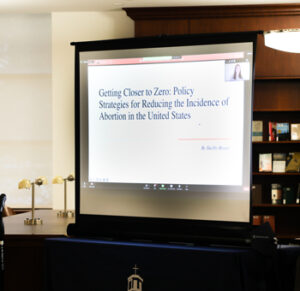 Shelby Braun presented her findings via Zoom while she studied at Oxford. Braun, a psychology major from Wellington, Florida, joined via Zoom from Oxford University, where she is continuing her studies. Braun chose her topic, State Level Strategies for Reducing the Incidence of Abortion, and was well into her research before the Supreme Court’s decision on Dobbs v. Jackson Women’s Health Organization, holding that there is no constitutional right to an abortion.
Shelby Braun presented her findings via Zoom while she studied at Oxford. Braun, a psychology major from Wellington, Florida, joined via Zoom from Oxford University, where she is continuing her studies. Braun chose her topic, State Level Strategies for Reducing the Incidence of Abortion, and was well into her research before the Supreme Court’s decision on Dobbs v. Jackson Women’s Health Organization, holding that there is no constitutional right to an abortion.
“The effects of the decision are still to be determined because most state legislatures have not met since the decision came down allowing states to set their own abortion policies,” Braun said. Braun’s adviser was Dr. James Todd, associate professor of politics and an expert on the Supreme Court and constitutional law.
Previously, states’ efforts to restrict abortion included prohibiting abortion after a specific gestational age, banning the use of public funds for abortion, restricting private insurance coverage, allowing private healthcare providers to refuse to participate in abortions, mandating counseling prior to an abortion and waiting periods.
“While New York has some of the most permissive abortion laws, Texas has among the most restrictive,” Braun said. In Texas, public, private and marketplace health insurance plans are not allowed to subsidize abortions in case of severe health risks to the mother, and abortions are banned after a fetal heartbeat is detected.
She found that “when insurance coverage for abortion is an option, it will be used to the full extent,” adding, “insurance is a very, very powerful tool that can be used to regulate abortion.”
Braun said “because state laws are so different, there is a lack of data to create effective policies for preventing unintended pregnancies.” She proposed mandated reporting measures and more transparency in data about abortions.
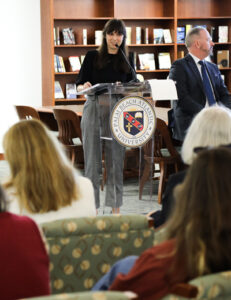 Shelby Kilpatrick presents her findings on using history education to bridge the ideological divide in today’s society. Kilpatrick, a politics major and history minor from Land o’ Lakes, Florida, is working in New York with plans to ultimately attend law school. Her topic was on improving the teaching of U.S. history as a way to address the ideological division in society. Dr. Elizabeth Stice, associate professor of history, served as Kilpatrick’s adviser.
Shelby Kilpatrick presents her findings on using history education to bridge the ideological divide in today’s society. Kilpatrick, a politics major and history minor from Land o’ Lakes, Florida, is working in New York with plans to ultimately attend law school. Her topic was on improving the teaching of U.S. history as a way to address the ideological division in society. Dr. Elizabeth Stice, associate professor of history, served as Kilpatrick’s adviser.
“Science, technology, engineering and math (STEM) are highly prioritized, and rightly so,” Kilpatrick said. But while many Americans believe history is the most valuable subject, “only half can identify when the Civil War took place, and only 18 percent understand what the Emancipation Proclamation is,” Kilpatrick said.
“Up until President Lyndon B. Johnson’s Great Society programs in the 1960s, education was largely dependent on the states. Even after that and up until President George W. Bush’s No Child Left Behind Act, the federal government focused on standards, rather than content,” she said.
Instead of a national policy, Kilpatrick proposed a market-based solution through the College Board. The College Board is recognized by all states as an effective avenue for high school students to earn college credit through AP courses. While the College Board requires teachers to use primary sources, it doesn’t dictate what those sources have to say.
“It’s non-profit, it’s non-partisan and it’s not federally endorsed,” Kilpatrick said.
“AP education is subsidized for lower-income families in some states but not in others, which creates unequal access to education,” Kilpatrick said. She proposed the federal government subsidized the $97 fee for the end-of-year AP tests required for credit.
LeMieux said he loved Kilpatrick’s proposal because “it’s targeted, focused and doable.” Stice asked how Kilpatrick envisioned history and civics interaction.
Kilpatrick replied, “History lays the foundation so students can be strong civic members.”
Hattie Murray, a political science and pre-law student from Lakeland, Tennessee, and Caleb Bowman, a history major from Jacksonville, Florida, were selected as Freidheim Fellows. Murray will examine the federal government’s use of nominally private entities to censor free speech. Bowman’s topic is U.S. involvement in Yemen and its role in the U.S. relationship with Iran.
Photo 2: Shelby Braun presented her findings via Zoom while she studied at Oxford.
Photo 3: Shelby Kilpatrick presents her findings on using history education to bridge the ideological divide in today’s society.
